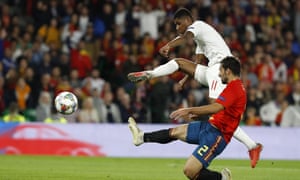There is a website called The Size of Belgium that for more than a decade has been dutifully tracking the Anglophone world’s curiously enduring habit of using the country’s area as a rhetorical unit of measurement. For example, “an area the size of Belgium” is lost globally to deforestation each year, according to the United Nations. The search area for missing flight MH370 was described in several media outlets as “the size of Belgium”. The Lonely Planet guidebook, meanwhile, refers to Yorkshire as “half the size of Belgium”.
How did Belgium ascend to this exalted status? Not, you have to assume, through any intimate or widespread knowledge of the precise area of Belgium (at 30,000 square kilometres, it’s barely twice the size of Yorkshire). Perhaps it is because, on some level, Belgium manages to convey slightness and weightiness in the same breath. It lies in the grey area between small and significant. It can, in other words, mean anything you want it to mean.
And so to Belgium v England, a meeting between one of the undisputed giants of the international game and a plucky underdog. Which is which depends very much on your framing. Despite their 2-1 defeat at Wembley last month, Belgium remain the No 1 team in the world rankings, boasting the world’s greatest midfielder and one of the most frightening assemblages of talent seen in international football. They are, by most common measures, miles better than England. Yet given the size and stature of these two nations, the gulf between them still feels a little surreal, even if the noises coming out of the England camp suggest they are fully aware of it.
It was interesting to hear Gareth Southgate talking after the first fixture, when England were second best for large parts and still managed to beat a path to victory. “You’ve got to be perfect against these teams,” he said. “You can’t just play with the ball: against the best, how you defend as a team has got to be bang on. We were so compact. Our covering positions were so good.”
This is the closest Southgate has come to offering a template of how he sees England approaching the big tournament games that will define his legacy. Partly this is because games like this come along so rarely: Sunday’s game will be the third time in two years England have played opposition in the top 10 of Fifa’s rankings. There was the 0-0 draw (and penalty shootout win) against Switzerland in the 2019 Nations League finals. Belgium last month and now Belgium again, in a game moved to Leuven from Brussels because of a 10pm coronavirus curfew. These games are precious.
Far more valuable than the potential Nations League ramifications (in short, England really need a win; equally, nobody really cares) will be what Southgate learns about his team when they are technically outmatched, as they are certain to be at some point during next year’s European Championship. How effectively will they solve the problems they come across? How well will they ride out the rough periods? And – in many ways the crucial question – do they want the ball or not?
This is a less flippant question than it looks at first glance. Possession football has been part of England’s basic identity for a generation: often slow and ineffective, but possession football all the same. Accordingly, many of England’s tournament setbacks have come against teams who have either denied them the ball (Portugal 2004, Italy 2012, Croatia 2018) or punished their wastefulness with it (Germany 2010, Iceland 2016).

But over the past two years under Southgate, England have – for the first time in decades – sought to develop an articulate low-possession strategy against bigger teams. The foundation stone of this approach was the 3-2 win over Spain in Seville two years ago, a pulsating counterattacking masterclass pulled off with 26% possession. That may have been an extreme example, but against Belgium at Wembley, again England looked far more effective when sitting tight and picking their moments to break, often with quick long balls to a slaloming front three.
In the first half of that game, England had 53% possession but zero idea of what to do with it. Belgium simply waited for England to overcommit and then cut them open. In the second half, England sat in a tighter shape before hitting Belgium in transition. They had less than 40% of the ball but enjoyed seven shots to Belgium’s four and ran out streaky but worthy winners.
This is the context Southgate appears so keen to push defensive shape, compactness, positional discipline. It is an admission that England’s most effective strategy against bigger teams is to soak up pressure rather than exert it. It is unarguably the best way of maximising their strength – the liquid front three of Harry Kane, Raheem Sterling, plus one of Marcus Rashford, Mason Mount, Jadon Sancho or Jack Grealish – while covering up their lack of a Kevin De Bruyne-style playmaker who can roam, create, find space, pick defences apart.
By the same token, inviting gifted teams to play against you is by definition a high-wire act, carrying its own vector of risk and vague whiff of deference. This is the irony of Southgate’s likely approach and probably in clutch games for the foreseeable future: in order to topple the big countries, England may just have to start thinking like a small one.
from Football | The Guardian https://ift.tt/2IsGdK5
via IFTTT

No Comment